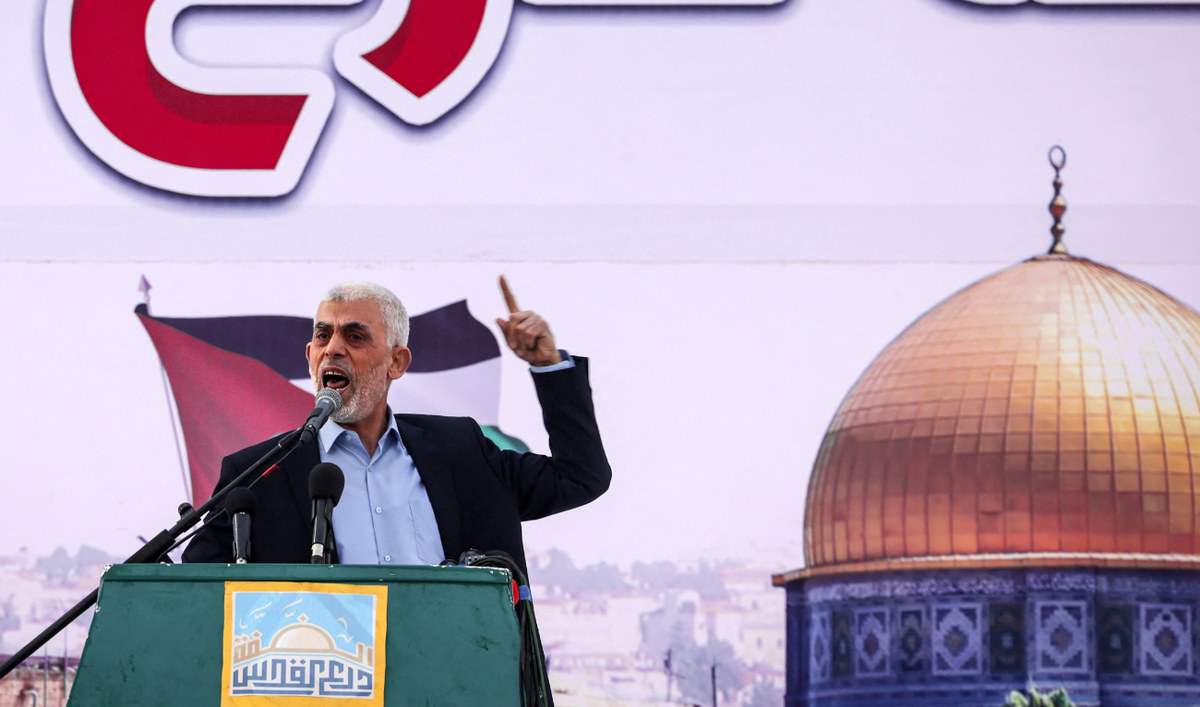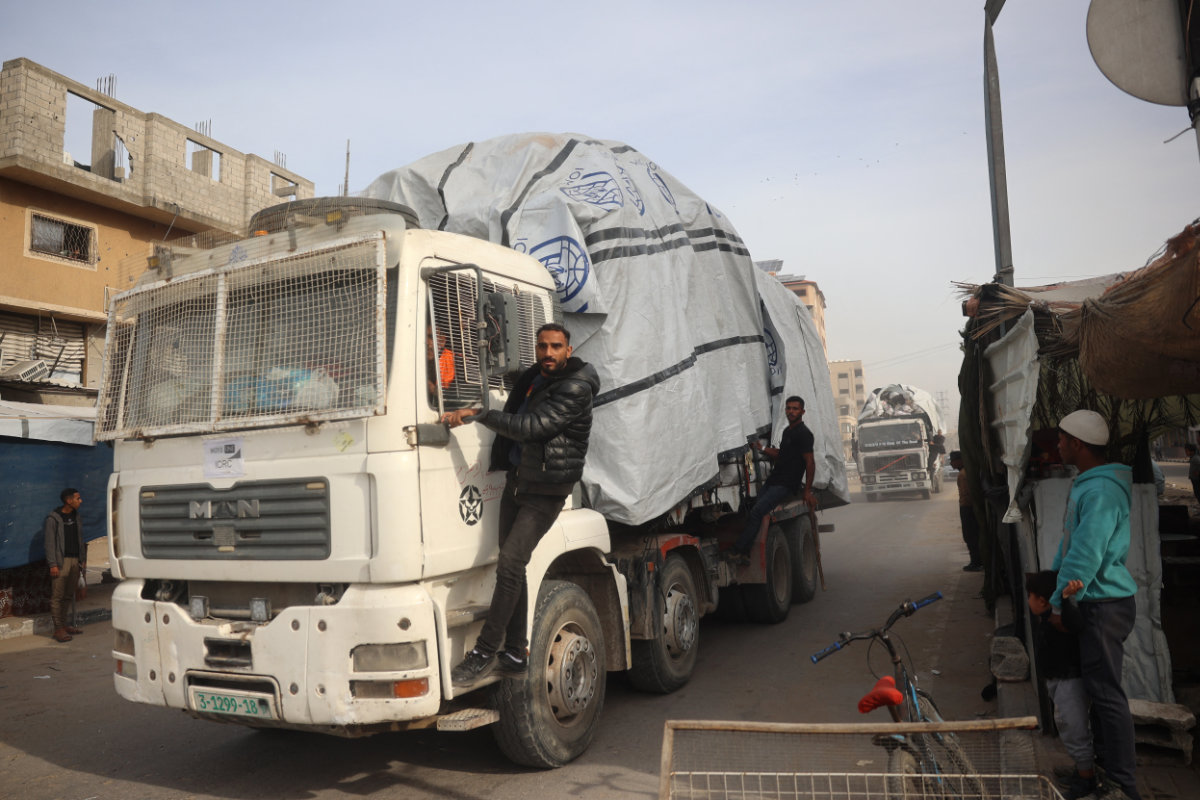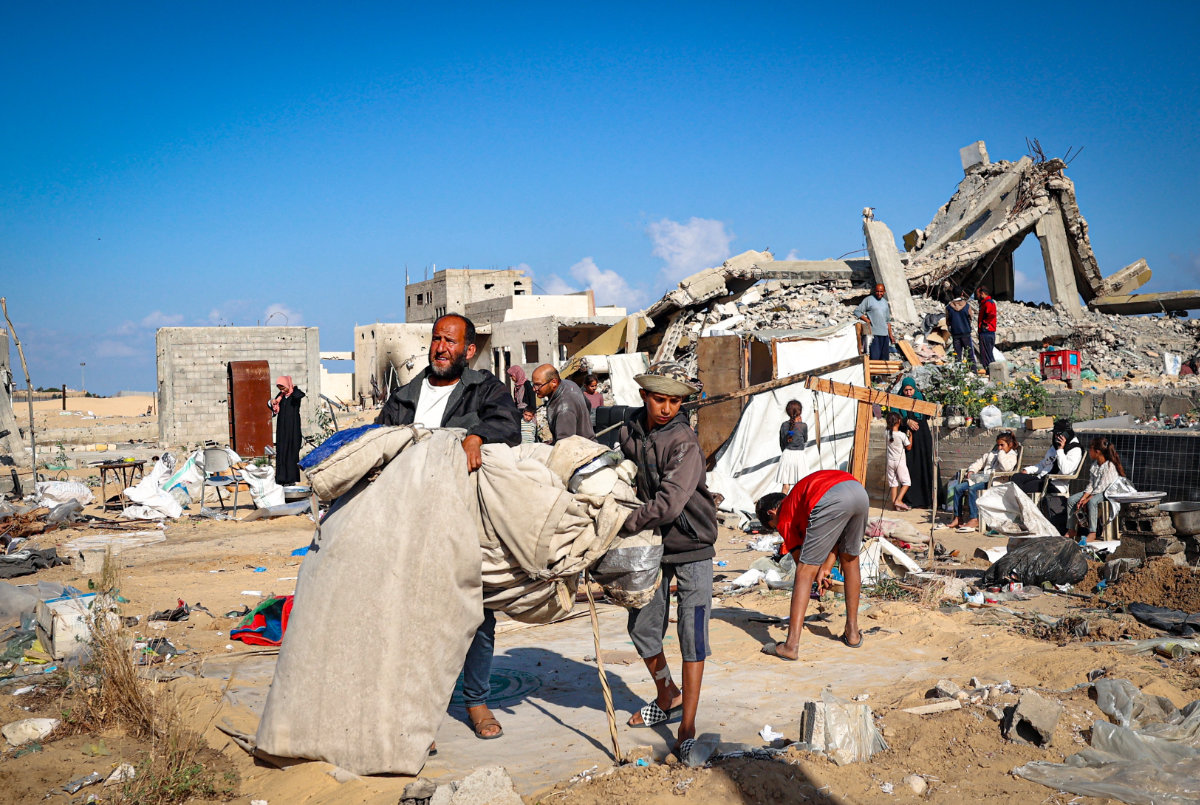LONDON: It has been 14 years since Israeli agents carried out one of Mossad’s most audacious, controversial and, perhaps, pointless assassinations.
On Jan. 19, 2010, Mahmoud Al-Mabhouh, the man responsible for procuring weapons for Hamas, was murdered in a hotel bedroom in Dubai.
It was a big operation, with many moving parts, involving almost 30 Mossad operatives who entered Dubai on false passports.
It ended with Al-Mabhouh being overpowered in his room at the Al-Bustan Rotana and given a fatal dose of suxamethonium chloride, a drug used in anesthetic cocktails.

People take part in a march called by Palestinian and Lebanese youth organizations in the southern Lebanese city of Saida, on August 5, 2024, to protest against the assassination of Hamas chief Ismail Haniyeh. (AFP)
To avoid leaving a tell-tale needle mark, the drug was administered with a device that used ultrasound to deliver it through the skin. The drug causes paralysis and, still conscious but with his lungs unable to function, Al-Mabhouh asphyxiated to death.
The assassins put him to bed and left, using a Mossad-developed device for putting hotel-door security chains in place from the outside of the room, hoping that Al-Mabhouh’s death would be attributed to natural causes.
It might have been, but for the vigilance of Dubai’s police chief. He suspected foul play and, by having the comings and goings through Dubai airport before and after the hit analyzed, and days of hotel security-camera footage examined in detail, put together a damning portfolio of evidence.
At the time, the killing was big news. Images of two Mossad agents posing as tennis players, emerging from an elevator behind Al-Mabhouh, appeared on televisions and newspapers around the world.
Today, however, for few outside Hamas or Mossad will the name Al-Mabhouh have any resonance. Certainly, his killing failed to have any appreciable impact on the flow of arms to the group.

Iran’s Supreme Leader Ayatollah Ali Khamenei (R) meeting with Palestinian Hamas movement leader Ismail Haniyeh in Tehran on July 30, 2024. (AFP)
This week, the killing of Ismail Haniyeh, chairman of the Hamas political bureau, is also big news — as was the killing on July 13 of Hamas military leader Mohammed Deif.
But soon, says Ahron Bregman, a former officer in the Israeli army and a senior teaching fellow in the Department of War Studies at King’s College London, the disruption caused by their deaths to the activities and ambitions of Hamas will disappear, as the ripples caused by a small pebble thrown into a large lake quickly vanish.
“The killing of Ismail Haniyeh will not change much as far as Hamas is concerned,” said Bregman, author of “The Fifty Years War: Israel and the Arabs” and the memoir “The Spy Who Fell to Earth,” an account of his part in the exposure of an Egyptian alleged double agent.
“Hamas is more than rifles, rockets and even leaders. Hamas is an idea.
“If Israel wants to defeat it, it must offer the Palestinians a better idea — say, a Palestinian state.
“If such an idea is not put forward, then Hamas will remain in place and rebuild itself for future battles with Israel.”
KEY HAMAS FIGURES
- Yahya Sinwar, Hamas’ Gaza leader, has just been named Ismail Haniyeh’s successor.
- Khaled Meshaal, a founding member, has mostly operated from the relative safety of exile.
- Khalil Al-Hayya, Doha-based deputy leader of Hamas, is said to have the backing of Iran.
- Musa Abu Marzouk lived for 14 years in the US before becoming deputy chairman of Hamas’ political bureau.
Hamas is an Islamist militant group that spun off from the Palestinian branch of the Muslim Brotherhood in the late 1980s. It took over the Gaza Strip after defeating its rival political party, Fatah, in elections in 2006.
The sheer number of killings of key Hamas figures carried out by Israel over the past quarter-century, and the negligible impact of these killings on the organization’s capabilities or objectives, speaks of a policy being carried out despite a lack of success — or, perhaps, in accordance with a less obvious, and probably domestically focused agenda.
Killing high-profile Hamas targets, and perpetuating the war in the process, makes it harder for Israelis inclined toward peace to criticize or plot to remove their wartime Prime Minister Benjamin Netanyahu.
Certainly, it is not difficult for Netanyahu’s critics to see the killing of Haniyeh as a deliberate tactic to derail peace talks.
Qatari Prime Minister Sheikh Mohammed bin Abdulrahman Al-Thani put it succinctly on X, writing: “How can mediation succeed when one party assassinates the negotiator on the other side?”

A woman walks near a billboard displaying portraits of Hamas leader Mohammed Deif (R) and Ismail Haniyeh with the slogan “assassinated” reading in Hebrew, in Tel Aviv, on August 2, 2024. (AFP)
Israel’s list of assassinations and attempted assassinations of Hamas leaders is a long one, and the killings have not always been as subtly carried out as the necessarily low-key Mossad hit on Al-Mabhouh in Dubai.
One of the first high-profile targets to be killed was Salah Shehadeh, the leader of Hamas’ military wing, who was targeted in Gaza on July 23, 2002, by an Israeli F-16 that dropped a massive bomb on his home.
Such was the cost in collateral damage — 14 others died, including Shehadeh’s wife and nine children — that 27 Israeli Air Force pilots had a fit of conscience, denouncing such attacks as “illegal and immoral” and “a direct result of the ongoing occupation which is corrupting all of Israeli society.”
The soul-searching did not last long, however. The toll of senior Hamas leaders has continued more or less unabated ever since.
Those who have been killed include Ahmed Yassin, who founded Hamas in 1987. He died 20 years ago, on March 22, 2004, in a hail of missiles fired from Israeli helicopters as he returned home from morning prayers in Gaza.
He was succeeded by Abdel Aziz Al-Rantisi, who died in similar fashion just 26 days later.

Iranians take part in a funeral procession for late Hamas leader Ismail Haniyeh, in Tehran, on August 1, 2024. (AFP)
Ahmed Al-Jabari, second-in-command of Hamas’ Al-Qassam Brigades, was targeted unsuccessfully five times before succumbing in Gaza City in November 2012 to a missile fired from a drone.
This year, unsurprisingly, has been a particularly busy one in terms of Hamas assassinations carried out by Israel. Hamas deputy and Haniyeh’s right-hand man Salah Al-Arouri was killed on Jan. 7 in an airstrike in Lebanon that also claimed the lives of several other senior Hamas commanders.
On March 11, Marwan Issa, deputy commander of Al-Qassam Brigades and Hamas No. 3, died in an airstrike in Gaza.
But none of these deaths — individually or taken together — has managed to turn Hamas from its path or hamper its ability to continue doggedly pursuing its aims militarily.
Haniyeh’s death is likely to have no greater immediate impact on Hamas’ capabilities than the assassinations that have gone before, said John Jenkins, former UK ambassador to Saudi Arabia and Iraq and a Middle East expert with the Centre for Geopolitics at Cambridge University.
But it might signal a change of strategy that bodes ill for any hopes of an immediate end to conflict.

Smoke billows from burning tires behind an Israeli army vehicle in Hebron on July 31, 2024, following a demonstration by Palestinians denouncing the killing of Haniyeh. (AFP)
“In the past, decapitation hasn’t worked — not with Hamas, nor with Hezbollah, nor Iran,” he said. “Or, at least, it has disrupted rather than interrupted.”
Israel, he added, “undoubtedly knows that. But it’s also thought for two decades that ‘mowing the grass’ is the best way to manage the conflict.”
That policy of simply keeping a lid on the problem “is now over — it collapsed on Oct. 7, 2023.
“So, the game now is destruction — of Hamas’ offensive capabilities and its ability to function as a significant political actor within the occupied Palestinian territories.
“That doesn’t mean killing the idea; that’s not possible. It means killing the capability. That’s why a ceasefire is a long way off.
“Spectacular assassinations are now part of a wider strategy of dismantling tunnels, command and control functions, logistics, and so on. That’s the only context in which they make sense.”
It is, however, a very dangerous game, with the killings of Haniyeh and Deif in Tehran and Beirut condemned by UN Secretary-General Antonio Guterres last week as “a dangerous escalation.”

Yemenis wave flags and lift placards of Hezbollah senior commander Fuad Shukr and Hamas chief Ismail Haniyeh during a rally in the Houthi-controlled capital Sanaa on August 2, 2024. (AFP)
Instead of Israel rampaging around the region on a killing spree — let alone assassinating Hamas’ Qatar-based negotiators, such as Haniyeh — “all efforts should instead be leading to a ceasefire in Gaza, the release of all Israeli hostages, a massive increase of humanitarian aid for Palestinians in Gaza and a return to calm in Lebanon and across the Blue Line,” said Guterres.
“This endless cycle,” he added, “needs to stop.”
In an interview with a British newspaper over the weekend, Amjad Iraqi, an associate fellow with Chatham House’s Middle East and North Africa program, warned that Israel’s increasingly audacious killings were indeed edging the region dangerously close to a regional war.
“People are not understanding the gravity of what this is,” he told the Independent.
“There is a kind of egotistical, unstable dance that all these actors are making with missiles and with people’s lives, while trying to explain it as calibrated responses.”
Only a ceasefire could cool things down, but as things stand, “we are at a very, very dangerous point.”

Muslims pray during the final prayers for Ismail Haniyeh at his funeral in the Qatari capital Doha on August 2, 2024. (AFP)
The reality of imminent escalation, said Burcu Ozcelik, senior research fellow for Middle East security at the Royal United Services Institute, “means that the ‘day after’ and the path to statehood seems even farther away now, with all sides focusing on the military outcome of the here and now, at the expense of immense civilian suffering and a viable political solution.”
For its part, Hamas, “to project resilience and the resolve of its leadership despite the assassination of Haniyeh, is trying to pivot quickly to appoint a new political bureau chief.”
A consultative process is under way “and, until a decision is made, such as the appointment of Khaled Mashal, for example, ceasefire negotiations cannot realistically recommence.”
As it has done many times before, in other words, Hamas will quickly grow a new limb to replace one that has been amputated.
But “a more urgent obstacle to restarting talks is that Hamas cannot be authorized to re-enter a diplomatic phase until Iran declares that the regime and its proxies have sufficiently retaliated against Israel for the series of high-profile assassinations, with much speculation around when that might happen.”

Mourners offer their condolences to senior Hamas official Khaled Mashaal (L) during the funeral of Ismail Haniyeh, in the Qatari capital Doha on August 2, 2024. (AFP)
The killing of Haniyeh has, she believes, “cornered Hamas into a dilemma that will determine how the organization evolves over time.
“On the one hand, the loss of a recognizable political leader will trigger radicalization among some Hamas supporters and embolden hardliners among the military faction such as Yahya Sinwar, his brother and their inner circle.
“On the other, with Hamas fighters suffering losses inside Gaza and its military infrastructure downgraded, Hamas will be looking for a lull in the fighting to recoup and plan ahead.
“But for Hamas, this is a long game, and it is far from over — key figures inside and outside Gaza will continue to struggle to consolidate Hamas and its victory narrative and position it for a role in post-war Gaza.”

An Indonesian protester holds up a placard with the image of Ismail Haniyeh during a pro-Palestinian demonstration in Surabaya on August 6, 2024. (AFP)
Ahron Bregman agrees that the killing of Haniyeh “might lead to a regional war in which Iran and Hezbollah could become involved. If the latter happens, it will play straight into the hands of Hamas’ leader, Yahya Sinwar, whose dream has always been that his Oct. 7 attack on Israel triggers a regional war.”
The assassination will also “put on ice any hostage deal, as both leaders, Netanyahu and Sinwar, are not interested in such a deal at the moment.
“For Netanyahu, a deal could spell the end of his coalition government. As for Sinwar, he will wait to see if the assassination at the heart of Tehran, which humiliated Iran, could lead to a regional war.”

Yahia Sinwar addresses supporters during a rally in Gaza City, on April 14, 2023. (AFP)
It is true, Bregman added, that “in recent months, Israel has managed to assassinate many of the Hamas leaders. Sinwar is quite on his own now, and I’m sure he’s got very few of the old guard to consult with.
“But Hamas is bigger and larger than any leader or leaders. When this war is over, there will still be Hamas — battered, leaner, but still standing and able to send rockets into Israel.
“The assassinations are tactical victories for Israel, but there is nothing strategic in it, not even in the possible killing of Sinwar himself.”

Members of the Palestinian Joint Action Committee sit during a symbolic funeral for Ismail Haniyeh, in Beirut, on August 2, 2024. (AFP)
Ultimately, the cost of Israel’s campaign of assassinations could be borne by Israelis and Palestinians alike.
The details of the operation to kill Al-Mabhouh in Dubai in 2010 emerged in the book “Rise and Kill First: The Secret History of Israel’s Targeted Assassinations,” published by Israeli historian and investigative journalist Ronen Bergman in 2018.
Bergman concluded that, because Israel’s intelligence community had always “provided Israel’s leaders sooner or later with operational responses to every focused problem they were asked to solve,” that very success had “fostered the illusion among most of the nation’s leaders that covert operations could be a strategic and not just a tactical tool — that they could be used in place of real diplomacy to end the geographic, ethnic, religious, and national disputes in which Israel is mired.”
As a result, Israel’s leaders “have elevated and sanctified the tactical method of combating terror and existential threats at the expense of the true vision, statesmanship, and genuine desire to reach a political solution that is necessary for peace to be attained.”



































